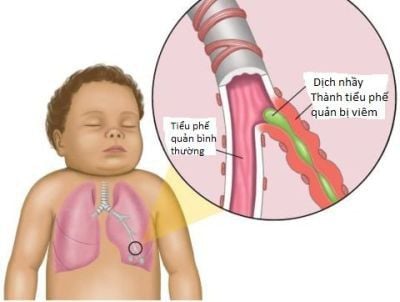This is an automatically translated article.
The article was professionally consulted with Master, Doctor Phan Ngoc Hai - Doctor of Pediatrics - Neonatology - Department of Pediatrics - Neonatology - Vinmec Danang International General Hospital.Congenital soft laryngeal cartilage in newborns causes the epiglottis to narrow during inspiration, leading to airway obstruction.
1. Causes of soft cartilage in the larynx
Laryngeal laxity is usually congenital but may not be hereditary. The exact cause is unknown. It can be caused by weak muscle tone and immature muscles in the upper airways.In neonatal laryngeal flaccidity, the epiglottis or funnel cartilage is softened. These soft tissues are pushed into the airways causing temporary partial obstruction of the airways during inspiration. These tissues are pushed back when the child exhales and reopens the airway.
2. Diagnosis of soft laryngeal cartilage

Fluoroscopy of the airways can see the airways and other structures in the neck and chest while the child is breathing.
Oral barium contrast is a test used to see the structures around the airways, esophagus, and stomach while a child is swallowing this particular liquid. With more and more advanced exploration techniques and methods, this method is rarely used.
Then, the doctor will order X-rays when needed to identify problems that may accompany the disease. X-rays of the neck and chest area will help the doctor see the structure of the airways that attract air under the epiglottis.
Need to take the child to the doctor or emergency room if:
Cyanosis or stops breathing for more than 15 seconds The child has contractions or hollowing of the chest and neck muscles for a long time. Difficulty eating, choking on food, not getting enough of the usual amount, or reducing the amount of stool in diapers Difficulty gaining or losing weight.
3. Soft treatment of laryngeal cartilage
Is congenital laryngeal softening dangerous? depends on the condition of the patient. Often no aggressive treatment is needed when a child's symptoms are mild and the child is eating without difficulty, gaining weight, and reaching developmental milestones. When children reach 18-24 months old, they will stop having soft cartilage.However, some cases of soft cartilage in the larynx progress more seriously, such as: Causing gastroesophageal reflux, causing difficulty breathing even apnea and cyanosis. At this point, prompt intervention is needed.
There are two methods of treating laryngeal softening: medical treatment (ie using drugs without surgery) and surgical treatment (ie surgical intervention).
3.1 Medical treatment Over 99% will gradually resolve without any treatment, most will stop wheezing by 2 years of age. Wheezing will increase in the first 6 months after birth because the amount of air the baby breathes increases with age. There is no specific drug to treat this disease, only vitamin D and calcium supplements can be enhanced. Usually treated in the presence of gastroesophageal reflux and associated respiratory infections. If the baby can still suckle, play, gain weight normally, and only have wheezing in the first 2 months after birth, no further treatment is needed.

Please dial HOTLINE for more information or register for an appointment HERE. Download MyVinmec app to make appointments faster and to manage your bookings easily.
Recommended video:Tips for getting your child vaccinated without pain and crying














